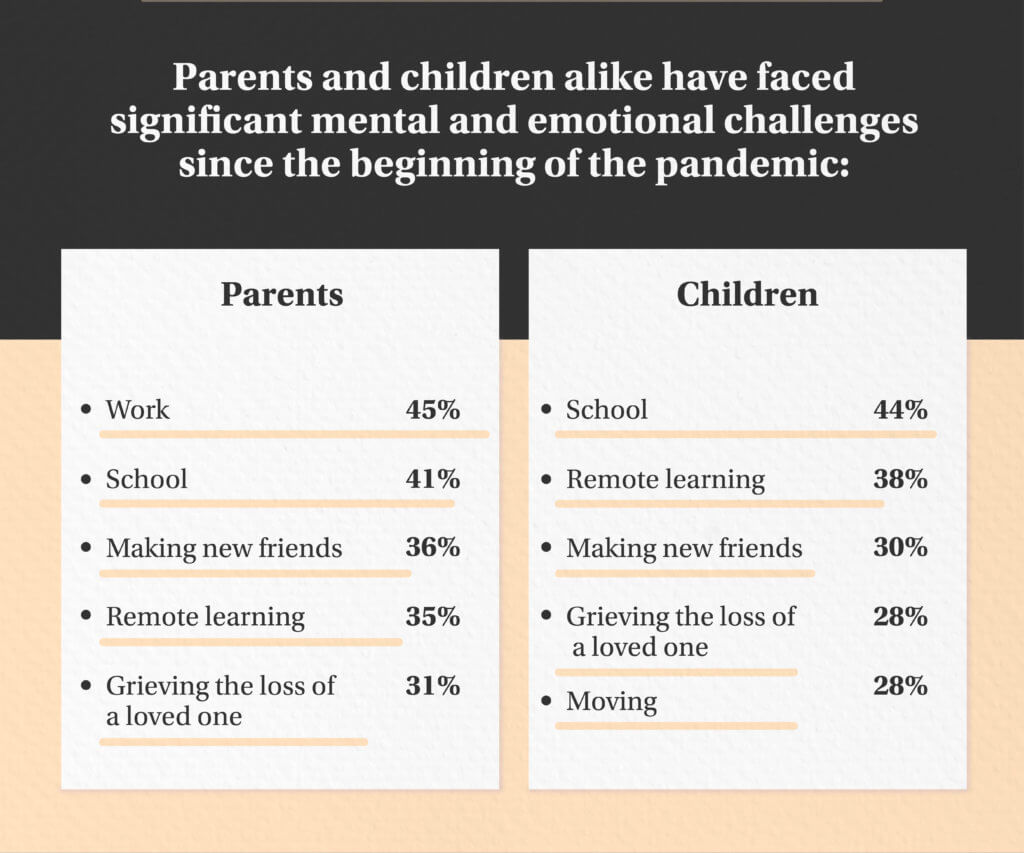NEW YORK — A new study finds children are just as stressed out as their parents – and the pandemic may be to blame. A recent survey of 2,000 American parents reveals that since the pandemic began, 68 percent have seen their children face significant mental and emotional challenges.
Among some of the biggest pandemic stressors for children: heading back to in-person school (44%), adjusting to remote learning (38%), and grieving the loss of loved ones (28%).
Half the poll believes that missing life milestones, such as participating in graduation ceremonies and birthday parties, has negatively impacted their child’s mental health.
Therapy for the whole family
Parents have also faced mental health challenges during the pandemic — the leading challenges people are facing revolve around work (45%), school (41%), and making new friends (36%). Child stress also affects parents, too, since 77 percent feel stressed if their children are themselves.
As a result, 63 percent of parents have sought a therapist for themselves, their children, or the entire family, according to the research conducted by OnePoll on behalf of LifeStance, a provider of virtual and in-person outpatient mental health care. Parents cite their child’s lack of socialization (47%), showing signs of depression or anxiety (45%) or losing interest in their favorite activities (40%) as the top reasons they sought therapy for their child.
When looking for a therapist, parents say the most important things they look for are professionals who can address their child’s mental health symptoms (42%), can offer both virtual and in-person sessions (33%), and can improve their relationship as a family (32%).
The research shows it takes the average child five therapy sessions before they start to feel comfortable with their therapist.
It takes a village…
More than eight in 10 parents (84%) who have sought help say their family now openly talks about their therapy sessions and 37 percent believe that therapy is helping them feel closer to their family than ever before. Over two in five (44%) feel they have a good support network within their family and circle of friends to help them support their child’s mental health.
“When a child is experiencing a physical health condition, most caregivers don’t think twice about reaching out to their pediatrician. Yet, emotional issues in children can be trickier to spot and, understandably, some parents may not know how or when to involve a mental health professional,” says Dr. Anisha Patel-Dunn, Chief Medical Officer of LifeStance, in a statement. “Mental health should be treated no differently than physical health—they’re incredibly intertwined, and both play a critical role in children’s wellbeing and development.”

Getting parents and kids on the same page
Half of the parents surveyed rejoiced that therapy has given them a better understanding of how to navigate through difficult situations that may arise in the future.
Both parents and children alike shared the same key tools they learned from therapy that have become their go-to solutions for coping with stress and anxiety — including meditation (49% and 32%, respectively), doing relaxing activities (45% and 47%), and exercise (40% and 41%).
The research also reveals that parents help their children cope with their stress by encouraging them to be honest and open (49%), talk about what’s bothering them (46%), and do fun activities together (44%). Nine in 10 parents who help their child cope with their stress using these tactics have found it successful.
Overall, 69 percent of parents now feel more attuned to their child’s mental health during the pandemic. Seventy-one percent add they’re more knowledgeable about their child’s mental health state. Half of parents talk to their child about mental health at least a few times a week, if not daily. Another 72 percent believe their child feels comfortable coming to them with any issue.
“The United States is in the midst of a mental health epidemic, and our children are facing many unprecedented challenges,” Dr. Patel-Dunn says. “While seeking out a therapist may feel intimidating, it’s the best thing you can do when you or your child are struggling – early prevention to address problems before they become larger issues is critical.”

The country is overwhelmed with Snowflake idiots
LOL…I’m not going to argue with you!
It’s children, you c**t.
OnePoll, like many other polls, just lost its credibility, too, if it expects readers to believe that 6 in 10 of U.S. families in the USA is seeking counselling. Maybe they’re trying to promote the counselling profession and get new customers. And with the state of journalism the author of this “piece” didn’t even question those numbers. So it amounts to what we are all becoming more and more aware of. And that is “Clicks make money.” It’s “Click bait.”
We have a pandemic still going on. We’re a step away from Armageddon.
The president has no clue where he is.
I’m not sure who they talked to but I don’t buy junk stats.
That’s BS. Sample size ?
Crap like this is way you can’t believe stories like this piece of drivel.
There’s an old saying that “The hand that rocks the cradle, rules the world.” This trend gives “therapists” incredible power to shape the attitudes of the next generation. Is that something that we, as a nation, really want?